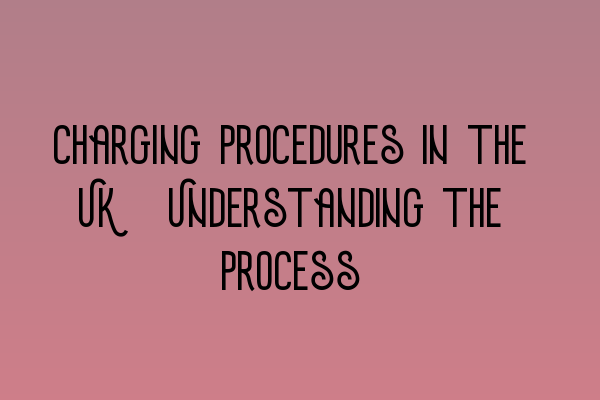Charging Procedures in the UK: Understanding the Process
Welcome to SQE Criminal Law & Practice Law UK, where we provide expert advice and guidance on all aspects of criminal law. In this blog post, we will be discussing the charging procedures in the UK and helping you understand the process involved. Whether you are a legal professional or an individual looking to gain knowledge in this area, this post aims to provide a comprehensive overview.
The Importance of Understanding Charging Procedures
Charging procedures play a pivotal role in the criminal justice system, as they are the initial steps taken by the authorities to formally accuse an individual of a criminal offense. Understanding these procedures is crucial, not only for legal professionals who handle criminal cases but also for individuals who may find themselves involved in the criminal justice process.
Before delving into the charging process, it is important to note that the exact procedures may vary slightly depending on the jurisdiction within the UK. However, the general framework remains consistent across the country.
The Charging Process:
The charging process begins with an investigation into a suspected criminal offense. Once the police have gathered sufficient evidence, they will present this evidence to the Crown Prosecution Service (CPS) for review. The CPS is responsible for making the decision on whether or not to proceed with formal charges.
The CPS will carefully assess the evidence provided by the police and determine whether it is strong enough to justify formal charges. They will consider factors such as the admissibility of evidence, witness statements, and the public interest in pursuing the case.
If the CPS decides to proceed with charges, they will issue what is known as a Charge Sheet. This document outlines the specific offenses that the defendant is being charged with and provides details of any additional allegations or aggravating factors.
Once the Charge Sheet has been issued, a court date will be set for the defendant’s initial appearance before a judge. At this stage, the defendant will be formally informed of the charges against them and will have the opportunity to enter a plea.
It is important to note that throughout the charging process, legal representation is paramount. If you or someone you know has been charged with a criminal offense, seeking expert legal advice from a qualified criminal defense solicitor is crucial.
Conclusion
In conclusion, understanding the charging procedures in the UK is essential for both legal professionals and individuals involved in the criminal justice system. Being aware of the steps involved, from investigation to the issuance of the Charge Sheet, can help individuals navigate the process more effectively.
At SQE Criminal Law & Practice Law UK, we offer comprehensive courses and preparation materials for the SQE 1 and SQE 2 exams. For those preparing for the SQE 1 exam, we have a range of valuable resources, including our SQE 1 Practice Exam Questions and SQE 1 Practice Mocks FLK1 FLK2. We also provide SQE 2 Preparation Courses for individuals seeking to enhance their knowledge and skills in criminal law.
If you want to stay updated with the latest SRA SQE Exam Dates, we have a dedicated page providing important information. Visit our SRA SQE Exam Dates page for more details.
Thank you for reading. For more information or expert legal advice, don’t hesitate to contact SQE Criminal Law & Practice Law UK.
